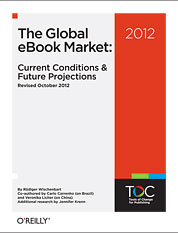
Join the ebook subscription model movement
Learn more and ask your questions at our free webcast on April 26
The ebook revenue stream has much more potential beyond simply selling standalone titles, one by one, to customers. If you’re not already offering your content in an ebook subscription program you need to. I’m not talking about a broad program like Amazon’s Kindle Owner Lending Library model; publishers and authors should focus instead on genre-specific vertical subscriptions that pay content creators based on the title’s performance, not some portion of a flat licensing fee assigned for an entire collection of titles.
The book as a standard of quality
It's time for the industry to agree on maintaining certain standards
Publishers have long commandeered respect for the quality of their work. Traditional processes may be cumbersome, reliant as they are on an infinity of minute, specialised steps, but they have helped maintain consistently high standards, at ever-lower prices. Authors may sometimes hold fantastic positions, but publishers have largely upheld their part of the bargain: giving them a clear, intelligible voice.

Automated ebook summaries
Here's one way B&N could distinguish Nook from other platforms
Yesterday I wrote about the opportunity to rethink the used book in the digital world. One option I suggested is for the community to create summaries of ebooks and sell them as bundles with the original work. Now I’m thinking about how the summary process could be automated and built into the ereader app.
I recently discovered a Chrome plug-in called CruxLight which highlights the key elements of a web page. If you’re pressed for time and just want to quickly scan the page CruxLight helps you out by highlighting the important pieces and providing a list of keywords.

Long-form content counterbalances short-form, for consumption as well as creation
Ev Williams on Medium and giving quality content a place.
The Internet gave rise to a plethora of short-attention-span content — one need only look to blog platforms, status updates, and the number of people skilled in writing in 140-characters. In recent months, however, we’re seeing an uptick in the desire for (and production of) deeper, quality content and long-form journalism on the web. Read more…

Used ebooks: Why your assumptions are wrong and the opportunity is huge
It can be so much more than simply lower-priced versions of the original work
Amazon has a patent and now Apple does too. I’m talking about the techniques both companies might use to let you resell your digital content. They join ReDigi, who already offers a platform to resell your digital music.
Ebooks are next, of course, and the concern I hear isn’t so much about the legal aspect but rather the risk of cannibalization. Most publishers seem hung up on the notion that a used ebook sale will mean one less original sale for them. And even if they participate in the used ebook revenue stream, they’re concerned that the selling price will be lower, so they’ll make less when cannibalization happens. I think that’s a very shortsighted view of the opportunity.

Publishing News: Apple’s used iBookstore?
Apple's used digital content patent, B&N's uncertain fate, and Ev Williams chats with Jason Calacanis about Medium.
Apple patent points to used digital resale
 Quick on Amazon’s heels, Apple has filed its own patent for selling or loaning used digital content, including ebooks, music, movies, and software applications. Mikey Campbell reported at Apple Insider that the patent, published Thursday by the U.S. Patent and Trademark office, “provides for the authorized access to digital content, otherwise known as digital rights, to be transferred from one user to another.” He noted that Apple’s patent differs from Amazon’s in that Amazon’s establishes a marketplace environment and Apple’s “decentralizes the process by taking the online store out of the equation.” Campbell quoted from the patent:
Quick on Amazon’s heels, Apple has filed its own patent for selling or loaning used digital content, including ebooks, music, movies, and software applications. Mikey Campbell reported at Apple Insider that the patent, published Thursday by the U.S. Patent and Trademark office, “provides for the authorized access to digital content, otherwise known as digital rights, to be transferred from one user to another.” He noted that Apple’s patent differs from Amazon’s in that Amazon’s establishes a marketplace environment and Apple’s “decentralizes the process by taking the online store out of the equation.” Campbell quoted from the patent:
“Alternatively, instead of a third party determining whether one or more criteria are satisfied, the first (or second) user’s device makes the determination and may be responsible for preventing the first user’s device from further consuming the digital content item. In some embodiments, the online store and/or the publisher of the digital content item may receive a portion of the proceeds of the transfer.”

The ISBN still has a place in the digital world
The Economist may think ISBNs are doomed, but Bowker's Laura Dawson has a different take.
A recent post at The Economist declared the International Standard Book Number (ISBN) an analog relic that “increasingly hampers new, small and individual publishers,” and an industry shift toward digital is “weakening its monopoly.” The post stated:
“Self-published writers are booming; sales of their books increased by a third in America in 2011. Digital self-publishing was up by 129%. This ends the distinction between publisher, distributor and bookshop, making ISBNs less necessary. … in the digital realm what matters is not the number that a publisher gives a book, but how easily it can be downloaded and for how much.”
I reached out to Laura Dawson (@ljndawson), product manager for identifiers at Bowker, to find out if the ISBN is indeed on its way out. Our interview follows.
Is the post at The Economist onto something? Are ISBNs becoming less necessary?
 Laura Dawson: ISBNs are necessary if the self-published author intends to sell her books using the traditional book supply chain. If the author is selling direct from her own website, or solely through Amazon (which doesn’t require ISBNs), then no ISBN is necessary. But if the author is distributing her books through a third-party distributor (such as Ingram, or Bookmasters, etc.), then an ISBN will be required. If the author is placing books at Barnes & Noble or Books-A-Million or Hastings, an ISBN will be required.
Laura Dawson: ISBNs are necessary if the self-published author intends to sell her books using the traditional book supply chain. If the author is selling direct from her own website, or solely through Amazon (which doesn’t require ISBNs), then no ISBN is necessary. But if the author is distributing her books through a third-party distributor (such as Ingram, or Bookmasters, etc.), then an ISBN will be required. If the author is placing books at Barnes & Noble or Books-A-Million or Hastings, an ISBN will be required.

Goodreads evolution from discovery platform to reader community
Goodreads CEO Otis Chandler on how Goodreads engages its more than 15 million registered users.
Last week, O’Reilly GM and publisher Joe Wikert reviewed Goodreads’ CEO Otis Chandler’s TOC session, in which Chandler presented the results of a recent Goodreads readers survey. One of the interesting pieces from the survey covered the effectiveness of Goodreads reviews. In relation to Gone Girl by Gillian Flynn and The Night Circus by Erin Morgenstern, 58% of surveyed readers said they bought Gone Girl because of Goodreads reviews and 52% said they bought The Night Circus because of Goodreads reviews.
The more interesting bit here, though, might be the sheer number of Goodreads reviews of each book: according to Chandler’s presentation slide, Gone Girl had 34,200 reviews and The Night Circus had 22,000. Compare that to the number of Amazon reviews (as of the time of writing) of 8,557 and 1,996 respectively.
I had an opportunity to sit down with Chandler during the TOC conference to talk about the Goodreads platform and how it has managed to become so engaging with its more than 15 million registered users. Chandler says the platform started with a mission of discovery but has evolved and become its own community:
“I think, first of all, our mission is book discovery. We’re basically in the business of helping people find good books and helping them share those books with friends. That’s something that people innately want to do, so we’ve created a place where you can connect to friends, browse all their bookshelves, find a ton of good books through that, and that was really the genesis of the site was to discover good books through your friends.

Self-publishers will be the publishers of the future
Tim O'Reilly on self-publishing and the cycles of democratization via technology.
Tim O’Reilly opened the TOC conference in New York a couple weeks ago with some words of optimism for the publishing industry, noting that copyright common sense is gaining momentum and that our fears of the future are abating. “The fear that everybody had that the new thing was going to be a bad thing is going away,” he said. (You can watch O’Reilly’s keynote on YouTube.)
I had the opportunity to sit down with O’Reilly to talk about the bright future of publishing — a future in which he said self-publishing is going to play a major role:
“There’s no question in my mind that self-publishing is the wave of the future, with one big caveat: self-publishers will become publishers. You know, everybody sees the beginnings of a new democratization via technology. People take advantage of it, they get good at what they do, then they start to extend their services to others.

PlayTales one year later
New apps, new technology, and new statistics
In March 2012, Joe Wikert posted an interview with a new bookstore app startup called PlayTales. Since then the app market has continued to grow, and PlayTales along with it. My name is Kate Shoaf, PlayTales’ PR and communications manager, and I’d like to tell you how we’ve modified our apps and distribution platforms to suit the ever-changing international app market.






 Radar
Radar  Radar on
Radar on  Radar on
Radar on  Radar on
Radar on  Radar on
Radar on